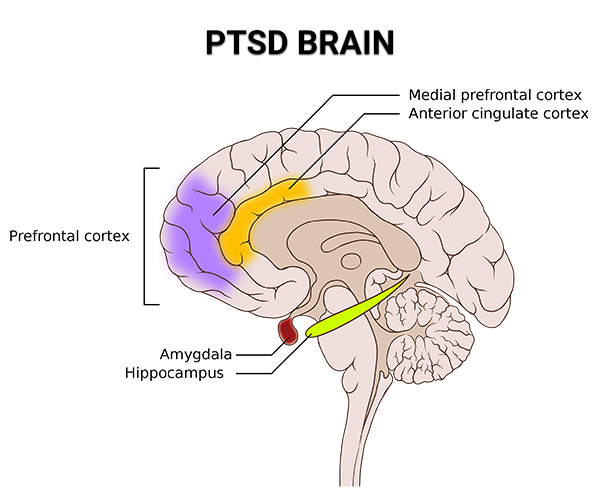Table of contents
Recognizing the triggers and symptoms of post-traumatic stress disorder (PTSD) is an important step in your recovery process. You don’t have to continue reacting in ways that affect your relationships and your quality of life when the best PTSD treatment is available in New York, New Jersey and Florida at Online Psychiatrists. Each treatment plan is designed with your specific needs in mind, employing an integrative approach to treat both your mind and your body. Call today for an appointment.
What Is PTSD?
Post-traumatic stress disorder (PTSD) is a mental illness that can develop after you experience a trauma. Major traumas include situations in which you suffer a serious threat to your life or witness a frightening event happening to someone else. There are actually three types of trauma:
- Big T traumas
- Small T traumas
- Little T traumas
Events such as being kidnapped, witnessing a murder or a serious car accident, living through a natural disaster or undergoing severe physical or sexual abuse constitute big T traumas. When searching for PTSD treatment in New York, New Jersey or Florida, you’ll find Online Psychiatrists. It’s a psychiatric practice that combines compassion with knowledge and experience to provide the most accurate diagnosis and the best treatment for PTSD.

How Can I Recognize Post-Traumatic Stress Disorder?
Not everyone who experiences traumatic events develops PTSD. You typically need to have a big T trauma in your history to receive a diagnosis of PTSD. The condition leads to a host of symptoms that are unique to each individual. Common PTSD symptoms include:
- Insomnia
- Irritability
- Intrusive memories or dreams
- Flashbacks
- Avoidance of triggers
- Negative thinking patterns
- Hypervigilance
- Startling easily
- Problems concentrating
- Excessive fear and anxiety
- De-realization — feeling like everything is a dream
PTSD can also lead to other co-occurring disorders, such as:
If you or someone you know is experiencing symptoms of PTSD, it is essential to seek professional help. There are effective treatments available that can help people with post-traumatic stress disorder recover and lead healthy, fulfilling lives.
Patient Experience
★★★★★Dealing with PTSD can be overwhelming, but the virtual visits with Dr. Zlatin have made it much more manageable. He's been patient, and supportive, and has helped me find the right medication to help with my symptoms. I highly recommend this service to anyone seeking effective and convenient mental health treatment.
Google ReviewsHarvard Certified
Nationally Recognized
Book Appointment >Does PTSD Cause Complications?
Researchers believe that when you experience a serious trauma, the brain may not be able to process and understand what’s happening. So the brain gets stuck and continues to respond as if the threat was still going on even when it has passed. As a result, you’re subject to serious behavioral complications, such as:
- PTSD impedes how you function every day, affecting not only how you respond to others, but also limiting what you can and can’t do.
- It strains your relationships to the point of isolation.
- PTSD may make you feel alone or ashamed, since you can’t control the symptoms.
- It’s common to believe that no one can understand what you’re going through.
But the way PTSD works is also good news because the best PTSD therapy allows you to finish processing the trauma and put it behind you. Helping you understand what’s going on is a specialty of Online Psychiatrists.
Read more: PTSD Examined: The Five Types Of Post Traumatic Stress Disorder
What Kind of Talk Therapy Treats PTSD in NYC?
Cognitive behavior therapy (CBT) focuses on finding the beliefs and thoughts that are holding you back and challenging you. The talk therapy then helps you replace them with more positive thoughts. During trauma-focused CBT, you uncover negative beliefs that many trauma survivors develop such as:
- “It’s my fault.”
- “I should have known better.”
- “I am weak.”
Trauma-focused CBT helps you tell a new story about your experience. It involves working on the skills you need to face things like flashbacks, triggers and interpersonal difficulties. Over time, you develop a more accurate and kinder understanding of what happened. Education about PTSD, as well as support group, helps you recognize that you’re not alone and that you can get better.
Are There Other Therapies That Work?
There are two other therapies that have proven results:
- Exposure therapy is a PTSD treatment for which you list the images and experiences you fear, and then you gradually learn to face them. This can be done in your imagination or in person by doing things like going to places that trigger you. As you face these situations, the emotional center of your brain slowly realizes that you’re no longer in danger.
- Eye movement desensitization and reprocessing (EMDR) is a newer type of exposure therapy that’s becoming more popular. During this PTSD treatment in NYC, NJ or FL, you relive traumatic experiences by describing them vividly to your therapist while following his finger back and forth with your eyes. This exercise stimulates both halves of your brain so that you can process the trauma and get it out of the emotional centers and into the more logical centers of your brain.
People who have post-traumatic stress disorder can benefit from a variety of psychotherapies. Some address PTSD therapy, while others tackle social, family, or job-related problems. Your PTSD therapist may combine different therapies depending on your unique needs.
Mind-Body Treatment

PTSD clearly affects both the mind and the body. Nightmares can result in cold sweats. Fearful automatic thoughts can result in adrenaline rushes. Depression can squash your appetite and energy levels. Our expert PTSD therapist treats post-traumatic stress disorder and other mental disorders with an integrative approach to treat all aspects of your condition.
FAQ's
Are There Physical Problems That Are Commonly Associated With PTSD?
In addition to the thoughts and feelings identified in the What is PTSD? section, people with PTSD may also experience physical symptoms, such as increased blood pressure and heart rate, fatigue, muscle tension, nausea, joint pain, headaches, back pain or other types of pain. The person in pain may not realize the connection between their pain and a traumatic event. For people with chronic pain, the pain may actually serve as a reminder of the traumatic event, which in turn may intensify PTSD symptoms. Some people who develop PTSD and chronic pain also experience depression and alcohol and prescription medication misuse. Chronic PTSD has been shown to increase the risk of having a variety of health issues and decreased life expectancy.
My Spouse Has Just Been Diagnosed With PTSD, How Can I Best Help?
A person contending with exposure to a traumatic event may feel helpless, prompting a concerned spouse to want to take action to help. Perhaps the most powerful approach is to just be there for the person, show acceptance and concern, and listen without being judgmental or giving advice. Allow your spouse to talk about the trauma only if he or she would like to and encourage additional support from family, friends and faith and community resources. Encouraging healthy living, such as attention to diet, exercise and refraining from smoking and excessive use of alcohol, is important. It would also be a good time to plan relaxing enjoyable leisure time activities.
Take some time to educate yourself about trauma, PTSD and recovery and healing. Learning about what your spouse may be going through will help you and your family to understand better and be more supportive. Remember to take care of your own physical and mental health as well.
Why Do Some People Get PTSD After a Traumatic Event and Others Don’t?
Studies have found that in fact most people recover and do not develop PTSD after exposure to a major traumatic event. However some people find themselves feeling worse as time passes and experience the symptoms of PTSD. Several factors before and after a traumatic event seem to increase the likelihood of PTSD. For example, the risk is greater when the traumatic event is more severe, violent, occurs over a longer period of time or involves harm to oneself or loss of a loved one. Being around reminders of the traumatic event can also increase the risk. In general women are more likely than men and younger people more likely than older to experience PTSD. People who had early childhood emotional problems, especially exposure to traumatic events, are more susceptible, as are people who suffer from chronic medical or psychiatric illness.
What’s the Difference Between a Normal Reaction to a Traumatic Event and PTSD?
People react to experience of trauma in a variety of ways, such as sadness, irritability and confusion. In the immediate aftermath of a major traumatic event most people complain of stress, difficulty concentrating, sleeping or getting along with others. With PTSD, the troubling symptoms worsen, affect social and work functioning, and persist longer than a month. If you or a loved one are struggling to cope with the effects of a trauma it would be useful to seek professional help.
How Can I Find Out More About Different Types of Therapies and Treatments for PTSD?
Several effective treatment options are available including psychotherapies such as cognitive behavioral therapy (CBT), cognitive processing therapy (CPT), prolonged exposure therapy (PE), and eye movement desensitization and reprocessing (EMDR); and medications, such as the antidepressants known as selective serotonin reuptake inhibitors (SSRIs). Often the combination of medication and psychotherapy is more effective than either form of treatment alone.
A good overview of effective treatment options for PTSD is available from the National Center for PTSD in the publication “Understanding PTSD Treatment.” Specific treatment guidelines are available from the International Society for Traumatic Stress Studies. Information on treatment for children is available from the National Child Traumatic Stress Network.
Self-help tools, including PTSD Coach Online and PTSD Coach app, are available from the National Center for PTSD. These offer support for coping with sadness, anxiety and other symptoms that people who have been through trauma can develop. They can help you relax when you feel stressed, improve your mood, learn how to tackle difficult problems and help change thinking patterns.
Can Children Experience PTSD?
Years of research suggest that children are vulnerable to developing PTSD after exposure to a traumatic event, though the symptoms may differ for young children, older children, adolescents and adults. The loss of a parent through death or by separation, especially if sudden, may be stressful for a young child. Physical and sexual abuse may also lead to traumatic symptoms in children and adolescents.
Children with PTSD may experience distressful thoughts. Memories of the trauma may occur without warning. Children may also have trouble falling and staying asleep and have nightmares. They may try to avoid people or objects that serve as reminders of the event and they may act more irritable, have angry outbursts or be easily startled. They may exhibit behaviors more typical of younger children, such as bedwetting or baby talk, and they may experience physical symptoms, including headaches and stomachaches. The symptoms can be upsetting and can impact how a child functions in school and relates to family members and peers.
Helping a child with PTSD generally involves assisting the child, parents and caregivers, creating a feeling of safety, helping the child speak about his or her feelings and experiences directly or through art and play, and teaching the child relaxation and coping skills.
For more information on understanding and helping children of all ages heal from traumatic events visit the National Child Traumatic Stress Network.
Diet, exercise, and building a routine are part of any PTSD therapy. Because trauma can lead to symptoms that require medication, rely on a psychiatrist who can provide you with ongoing medication management. Сontact Online Psychiatrists in NYC, NJ, and FL, where convenient online telepsychiatry is a specialty.
